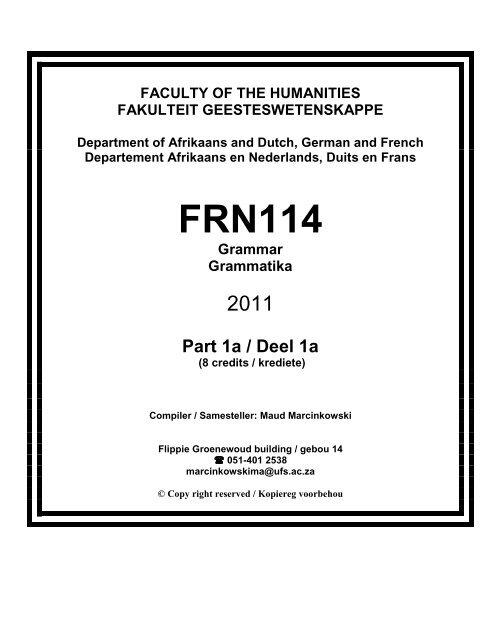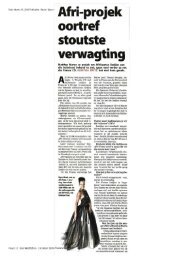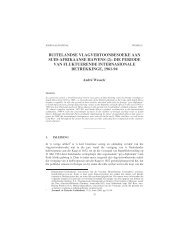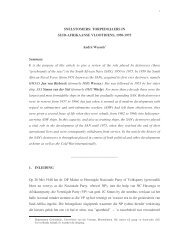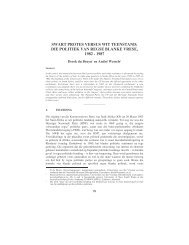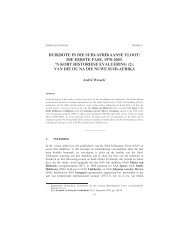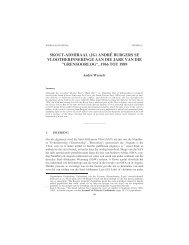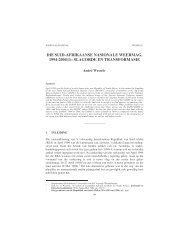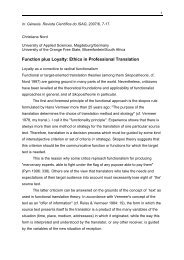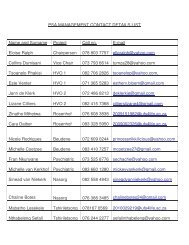Study guide FRN114 Grammar/Grammatika - Faculty of The ...
Study guide FRN114 Grammar/Grammatika - Faculty of The ...
Study guide FRN114 Grammar/Grammatika - Faculty of The ...
You also want an ePaper? Increase the reach of your titles
YUMPU automatically turns print PDFs into web optimized ePapers that Google loves.
FACULTY OF THE HUMANITIES<br />
FAKULTEIT GEESTESWETENSKAPPE<br />
Department <strong>of</strong> Afrikaans and Dutch, German and French<br />
Departement Afrikaans en Nederlands, Duits en Frans<br />
<strong>FRN114</strong><br />
<strong>Grammar</strong><br />
<strong>Grammatika</strong><br />
2011<br />
Part 1a / Deel 1a<br />
(8 credits / krediete)<br />
Compiler / Samesteller: Maud Marcinkowski<br />
Flippie Groenewoud building / gebou 14<br />
051-401 2538<br />
marcinkowskima@ufs.ac.za<br />
© Copy right reserved / Kopiereg voorbehou
IMPORTANT INFORMATION: <strong>FRN114</strong> (2011)<br />
THE GRAMMAR SECTION OF THIS MODULE MAKES UP 8 OF THE 16 CREDITS FOR THIS<br />
MODULE. ALL THE INFORMATION IN THIS GUIDE PERTAINS TO THE GRAMMAR SECTION<br />
ONLY.<br />
During the first year, all classes are presented in Afrikaans (morning classes) and English (evening classes)<br />
except for the practical classes which will be bilingual. Students can therefore choose which <strong>of</strong> the classes they<br />
want to attend according to their time-tables.<br />
1. PRESCRIBED TEXTBOOKS<br />
<strong>The</strong> following textbooks are prescribed:<br />
2. LECTURERS<br />
+<br />
- A. Berthet, C. Hugot, V. Kizirian, B. Sampsonis & M.<br />
Waendendries. Alter Ego 1 - Livre élève. Hachette.<br />
- A. Berthet, C. Hugot, B. Sampsonis & M. Waendendries.<br />
Alter Ego 1 - Cahier d'activités. Hachette<br />
<strong>The</strong>se books are available from Van Schaik’s on campus.<br />
Afrikaans grammar and practical classes English grammar and practical classes<br />
Ms. Anne Gauert<br />
Office: FGG 15A<br />
- 1 -<br />
Ms. Maud Marcinkowski<br />
Office: FGG 14<br />
<strong>The</strong> lecturers’ consultation hours will be posted outside FGG 14/15A as soon as the time tables have been<br />
finalised (within the first weeks <strong>of</strong> the semester). Students are welcome to contact either <strong>of</strong> the lecturers<br />
concerning the grammar classes or homework.<br />
3. ASSISTANTS<br />
Ms. Loraine Bester and Ms. Isabel Mostert<br />
Office: FGG 15<br />
Telephone: 051-401 9022 (mornings)<br />
If students experience any problems related to this module, they are invited to contact the lecturer before<br />
or after classes or during consultation hours. Alternatively they could leave a message and telephone number with<br />
the student assistant in FGG15. <strong>The</strong> lecturer will then contact the student to discuss the matter.<br />
4. ASSESSMENT GUIDELINES<br />
A new back-to-back examination system will be implemented at the University <strong>of</strong> the Free State as from<br />
2011. This implies a compulsory attendance at the first examination opportunity. Admission to the additional<br />
examination opportunity (aegrotat; deferred or special examination) will only be possible if a student submits<br />
a written application on the required application documents. Complete policy documents and <strong>of</strong>ficial<br />
communication will go out to all students early in 2011. It remains the responsibility <strong>of</strong> each student to<br />
familiarise him-/herself with the new examination system and policy.
Module mark: Average <strong>of</strong> marks obtained throughout the semester for the two parts <strong>of</strong> the module:<br />
Part 1. <strong>Grammar</strong> + Part 2. Culture & Literature.<br />
<strong>The</strong> following make up the 100 marks <strong>of</strong> your semester mark for the module:<br />
(Average mark for part 1 + average mark for part 2) ÷ 2 = semester mark out <strong>of</strong> 100<br />
Semester marks out <strong>of</strong> 100 for part 1:<br />
• Two semester tests <strong>of</strong> 55 marks each (55%)<br />
Please note that there are three (3) test opportunities scheduled on the programme. Students have to<br />
write at least two (2) <strong>of</strong> these tests. If a student writes all three tests, the best two marks will be used to<br />
calculate the semester mark.<br />
NO SICK TEST WILL BE WRITTEN. IT IS THE STUDENT’S RESPONSIBILITY TO ORGANISE<br />
ACTIVITIES IN SUCH A WAY AS TO ASSURE THAT HE/SHE WRITES AT LEAST TWO TESTS.<br />
• One oral assessment <strong>of</strong> 15 marks (15%).<br />
• Written homework <strong>of</strong> 10 marks each (10%).<br />
• Work done in tutor classes once a week (10%)<br />
• Work done in resource centre (5%)<br />
• Attendance (5%)<br />
Marks out <strong>of</strong> 100 for part 2: (Please refer to the manual for this part <strong>of</strong> the module.)<br />
Examination mark: Mark out <strong>of</strong> 100 [(Paper 1 + Paper 2) ÷ 2] obtained during one <strong>of</strong> the examination sessions.<br />
Important information concerning the examinations:<br />
This module comprises two examination papers. <strong>The</strong> examination in both papers must be written during the<br />
same examination opportunity. If a student qualifies for a re-assessment in this module, he/she must write the<br />
examination in both papers during the re-assessment. (See Regulation A15, T15)<br />
A subminimum <strong>of</strong> 45% is required for paper 1 (<strong>Grammar</strong>) AND paper 2 (Culture & Literature). This means<br />
that a student cannot pass the module if he/she obtains a mark <strong>of</strong> less than 45% for this paper during the<br />
examination.<br />
A student who participated in the first scheduled examination opportunity in a given semester, obtained a final<br />
mark <strong>of</strong> at least 50 percent, but did not obtain the required subminimum <strong>of</strong> 45% (as stipulated in the study<br />
<strong>guide</strong>) in the examination, can participate in the second examination opportunity. (Regulation A 15 (e))<br />
No minimum semester mark is required in order to gain access to the examination.<br />
Final mark: A combination <strong>of</strong> the module (50%) and examination marks (50%).<br />
5. WEEKLY HOMEWORK<br />
Except for the first 3 pieces <strong>of</strong> homework, homework is to be done in class (see programme for dates). Students<br />
can attend either the morning or evening class as they will be bilingual on this day. THE HOMEWORK IS<br />
HANDED IN AT THE END OF THE CLASS TO BE EVALUATED. NO HOMEWORK DONE OUTSIDE OF<br />
THESE CLASS TIMES WILL BE ACCEPTED.<br />
6. TUTOR<br />
<strong>The</strong> tutor for <strong>FRN114</strong> is Isabel Mostert (MostertIMM@ufs.ac.za). <strong>The</strong>re are weekly tutor sessions which must be<br />
attended, as it counts 10% <strong>of</strong> your GRAMMAR module mark. Only work completed during the session will be<br />
marked. All work handed in late will not be taken into account, unless a prior arrangement has been made with<br />
the tutor. Students are encouraged to use these sessions to ask questions about the course work that they do not<br />
understand.<br />
- 2 -<br />
Bonne découverte!
BELANGRIKE INLIGTING: <strong>FRN114</strong> (2011)<br />
DIE GRAMMATIKA AFDELING VAN HIERDIE MODULE BESTAAN UIT 8 VAN DIE 16 KREDIETE<br />
VIR HIERDIE MODULE. DIE INLIGTING IN HIERDIE GIDS IS SLEGS VAN TOEPASSING OP DIE<br />
GRAMMATIKA AFDELING.<br />
In the eerste jaar sal alle klasse in beide Afrikaans (oggend-klasse) en Engels (aand-klasse) aangebied word<br />
met uitsondering van die praktiese klasse wat tweetalig sal wees. Studente kan dus volgens hulle klasrooster<br />
besluit watter klasse hul wil bywoon.<br />
1. VOORGESKREWE HANDBOEKE<br />
Die volgende handboeke is voorgeskryf:<br />
2. DOSENTE<br />
+<br />
- A. Berthet, C. Hugot, V. Kizirian, B. Sampsonis & M.<br />
Waendendries. Alter Ego 1 - Livre élève. Hachette.<br />
- A. Berthet, C. Hugot, B. Sampsonis & M. Waendendries.<br />
Alter Ego 1 - Cahier d'activités. Hachette<br />
Hierdie boeke is beskikbaar by Van Schaik’s op kampus.<br />
Afrikaanse grammatika en praktiese klasse Engelse grammatika en praktiese klasse<br />
Ms. Anne Gauert<br />
Kantoor : FGG 15A<br />
- 3 -<br />
Ms. Maud Marcinkowski<br />
Kantoor: FGG 14<br />
Die dosente se spreekure sal buite FGG 14/15A aangebring word sodra die roosters gefinaliseer is (binne die<br />
eerste weke van die semester). Studente is welkom om enige van die dosente te kontak rakende die grammatika<br />
klasse <strong>of</strong> die huiswerk.<br />
3. ASSISTENTE<br />
Ms. Loraine Bester and Ms. Isabel Mostert<br />
Kantoor: FGG 15<br />
Telefoonnommer: 051-401 9022 (soggens)<br />
Indien studente enige probleme rakende hierdie module ondervind, is hulle welkom om die dosent voor <strong>of</strong> na<br />
klas <strong>of</strong> tydens spreekure te kontak. Alternatiewelik kan hulle ‘n boodskap met ‘n kontaknommer by die studenteassistant<br />
in FGG15 laat. Die dosent sal die student dan kontak om die saak te bespreek.<br />
4. ASSESSERINGSRIGLYNE<br />
Vanaf 2011 word 'n nuwe rug-aan-rug eksamenstelsel by die Universiteit van die Vrystaat geïmplementeer. Dit<br />
impliseer dat studente verplig is om tydens die eerste geleentheid te skryf en slegs deur middel van 'n<br />
skriftelike aansoek toelating tot die aanvullende eksamen (aegrotat; her-eksamen; spesiale eksamen) sal kan<br />
bekom. Aansoeke moet op die voorgeskrewe dokumente ingedien word. Volledige beleidsdokumente en<br />
amptelike skrywes sal vroeg in 2011 na alle studente uitgestuur word. Dit bly elke student se<br />
verantwoordelikheid om hom-/haarself te vergewis van die nuwe eksamenstelsel en -beleid.
Module-punt: Gemiddeld van die punte wat deur die loop van die semester behaal is vir die twee dele van die<br />
module: 1. <strong>Grammatika</strong> + 2. Kultuur & Literatuur.<br />
Die 100 punte van die semesterpunt vir die module word as volg bereken:<br />
(Gemiddelde punt vir Deel 1 + gemiddelde punt vir Deel 2) ÷ 2 = semesterpunt uit 100<br />
Die module-punt (uit 100) vir Deel 1:<br />
• Twee semestertoetse van 55 punte elk (55%)<br />
Let asseblief daarop dat daar drie (3) toetsgeleenthede op die program verskyn. Studente moet ten<br />
minste twee (2) hiervan skryf. Indien ‘n student al drie toetse skryf, sal die twee beste punte gebruik<br />
word om die semesterpunt te bereken.<br />
GEEN SIEKETOETS SAL GESKRYF WORD NIE. DIT IS DIE STUDENT SE<br />
VERANTWOORDELIKHEID OM SEKER TE MAAK DAT AKTIWITEITE SO BEPLAN WORD<br />
DAT HY/SY TEN MINSTE TWEE TOETSE SKRYF.<br />
• Een mondelinge evaluasie van 15 punte (15%)<br />
• Geskrewe huiswerk van 10 punte elk (10%)<br />
• Werk gedoen in tutorklasse een keer per week (10%)<br />
• Werk gedoen in bronnesentrum (5%)<br />
• Attendance (5%)<br />
Die module-punt (uit 100) vir Deel 2: (Verwys asb na die handleiding vir hierdie deel van die module)<br />
Eksamenpunt: ‘n Punt uit 100 [(Vraestel 1 + Vraestel 2) ÷ 2] behaal tydens een van die eksamengeleenthede.<br />
Belangrike inligting rakende die eksamen :<br />
Vir hierdie module word twee eksamenvraestelle geskryf. Beide die eksamenvraestelle moet gedurende dieselfde<br />
eksamengeleentheid afgelê word. Indien ‘n student kwalifiseer vir ‘n her-assessering in hierdie module, moet hy/sy<br />
beide die eksamenvraestelle gedurende die her-assessering skryf. (Sien Regulasie A15, T15)<br />
‘n Subminimum van 45% word vereis vir vraestel 1 (<strong>Grammatika</strong>) EN vraestel 2 (Kultuur & Literatuur). Dit<br />
beteken dat ‘n student nie die module kan slaag indien hy/sy ‘n punt van minder as 45% gedurende die eksamen<br />
behaal nie.<br />
‘n Studente wat aan die eerste geskeduleerde eksamengeleentheid in gegewe semester deelgeneem het, ‘n finale<br />
syfer van minstens 50 persent behaal het, maar nie vereiste subminimum van 45% (soos gestipuleer in die module<br />
handleiding) in die eksamen nie, kan weer aan die tweede eksamengeleenthied deelneem. Regulasie A 15 (e)<br />
Geen minimum semesterpunt word vereis om toelating tot die eksamen te verkry nie.<br />
Finale punt: ‘n Kombinasie van die modulepunt (50%) en die eksamenpunt (50%).<br />
5. WEEKLIKSE HUISWERK<br />
Behalwe vir die eerste 3 opdragte, word huiswerk in die klas gedoen (sien program vir datums). Studente kan die<br />
oggend- <strong>of</strong> aandklas bywoon aangesien beide tweetalig sal wees. DIE HUISWERK WORD AAN DIE EINDE<br />
VAN DIE KLAS INGEHANDIG OM GEEVALUEER TE WORD. GEEN HUISWERK WAT BUITE HIERDIE<br />
KLASTYE GEDOEN IS SAL AANVAAR WORD NIE.<br />
6. TUTOR<br />
Die tutor vir <strong>FRN114</strong> is Isabel Mostert (MostertIMM@ufs.ac.za). Daar is weeklikse tutor sessies wat bygewoon<br />
moet word, aangesien dit 10% van die finale GRAMMATIKA modulepunt tel. Slegs werk wat in die sessies<br />
voltooi word sal gemerk word. Alle werk wat laat ingehandig word sal nie in berekening geneem word nie, tensy<br />
daar vooraf ‘n reëling met die tutor aangegaan is. Studente word aangemoedig om die sessies tot hul voordeel<br />
te gebruik en vrae te vra oor die werk wat hulle nie verstaan nie.<br />
Bonne découverte!<br />
- 4 -
PROGRAMME/PROGRAM 2011<br />
Semaine Dates Travail prévu<br />
1 24/01-28/01<br />
2 31/01-04/02<br />
3 07/02-11/02<br />
Alter Ego 1, Fenêtre sur…<br />
Se présenter, p.11<br />
Épeler son nom et l’alphabet, p.11<br />
Dire quelle langue on parle, p.12<br />
Faire connaissance, dire la nationalité, p.12 > rejouer les scènes du dialogue<br />
Point Langue > les nationalités, p.13 + S’exercer nº1 p.15<br />
Point Langue > s’appeler / être, p.13 + S’exercer nº2 p.15<br />
Phonétique, p.13<br />
Identifier un nombre, compter, p.14/15<br />
Communiquer en classe, p.16<br />
Alter Ego 1, Dossier 1, Leçon 1, Sur le campus<br />
Saluer, p.18 nº1 → 3<br />
Homework to be handed in on Monday, 07/02<br />
Dictionary know-how (1) [see p.10 <strong>of</strong> this <strong>guide</strong>]<br />
Huiswerk wat op Maandag, 07/02 ingehandig moet word<br />
Hoe om 'n woordeboek te gebruik (1) [sien bl.10 van hierdie gids]<br />
Point culturel > tu / vous, p.19 + S’exercer, nº1 p.21<br />
Phonétique, p.18 & 19<br />
Aide-mémoire, p.19 + S’exercer, nº2 p.21<br />
Jeu de rôle, nº6 p.19<br />
Se présenter, p.20<br />
Homework to be handed in on Monday, 14/02<br />
Dictionary know-how (2) [see p.11/12 <strong>of</strong> this <strong>guide</strong>]<br />
Huiswerk wat op Maandag, 14/02 ingehandig moet word<br />
Hoe om 'n woordeboek te gebruik (2) [sien bl.11/12 van hierdie gids]<br />
- 5 -
PROGRAMME/PROGRAM 2011<br />
Semaine Dates Travail prévu<br />
4 14/02-18/02<br />
5 21/02-24/02<br />
6 28/02-04/03<br />
Point Langue > Avoir au présent, p.20 + S’exercer, nº3 p.21<br />
Vocabulaire, nº10 p.21<br />
Aide-mémoire, p.21<br />
Point Langue > article défini, p.21 + S’exercer, nº5 p.21<br />
Point Langue > négation, p.21 + S’exercer, nº4 p.21<br />
Alter Ego 1, Dossier 1, Leçon 2, M comme médiathèque<br />
Demander des informations, p.22 > rejouer les scènes du dialogue<br />
Point Langue > article indéfini, p.22<br />
Questionner sur l’identité, p.23 nº3 → 5<br />
Aide-mémoire, p.23 (+ nº7)<br />
TEST / TOETS 1 : Friday 18 February / Vrydag 18 Februarie 2011<br />
Alter Ego 1, Fenêtre sur… + Dossier 1, Leçon 1<br />
Point Langue > l’adjectif interrogatif, p.23 + S’exercer, p.25 nº1&2<br />
Comprendre / Dire des coordonnées, p.24<br />
Point Culture > numéros de téléphone, p.24<br />
Aide-mémoire, p24 + S’exercer, p.25 nº3<br />
Phonétique, p.25 nº12 / 14 + S’exercer, p.25 nº4<br />
À l’oral, dites votre numéro de téléphone et votre courriel.<br />
Alter Ego 1, Dossier 1, Leçon 3, En direct de TV5<br />
Donner des informations personnelles, p.26<br />
Homework to be handed in on Monday, 28/02<br />
Dictionary know-how (3) [see p.13/14 <strong>of</strong> this <strong>guide</strong>]<br />
Huiswerk wat op Maandag, 28/02 ingehandig moet word<br />
Hoe om 'n woordeboek te gebruik (3) [sien bl.13/14 van hierdie gids]<br />
Donner des informations personnelles, p.27 nº3&4<br />
Point Culture > la francophonie, p.27<br />
Point Langue > les prépositions + nom de pays, p.27 + S’exercer, nº1 p.29<br />
Exercices complémentaires<br />
Parler de ses passions et de ses rêves, p.28<br />
Aide-mémoire, p.28<br />
Point Langue > les verbes en –ER au présent, p.28 + S’exercer, nº2&3 p.29<br />
- 6 -
PROGRAMME/PROGRAM 2011<br />
Semaine Dates Travail prévu<br />
7 07/03-11/03<br />
8 14/03-18/03<br />
9 21/03-25/03<br />
Point Langue > Être et avoir, p.29 + S’exercer, nº4&5 p.29<br />
Phonétique, p.29<br />
Alter Ego 1, Dossier 2, Leçon 1, Le quartier a la parole<br />
Parler de sa ville, de son quartier, p.34 > rejouer les scènes du dialogue<br />
Homework to be done in class.<br />
Students can attend either the morning or the evening class as they will be bilingual on this day.<br />
THE HOMEWORK IS HANDED IN AT THE END OF THE CLASS TO BE EVALUATED. NO<br />
HOMEWORK DONE OUTSIDE OF THESE CLASS TIMES WILL BE ACCEPTED.<br />
Huiswerk word in die klas gedoen.<br />
Studente kan die oggend <strong>of</strong> aandklas bywoon aangesien beide tweetalig sal wees.<br />
DIE HUISWERK WORD AAN DIE EINDE VAN DIE KLAS INGEHANDIG OM GEEVALUEER TE<br />
WORD> GEEN HUISWERK WAT BUITE HIERDIE KLASTYE GEDOEN IS SAL AANVAAR WORD NIE.<br />
Parler de sa ville, de son quartier, p.35 n°3<br />
Aide-mémoire, p.35<br />
Point Langue > les articles, p.35 + S'exercer, p.37 n°1&2<br />
Point Langue > les articles contractés, p.35 + S'exercer, p.37 n°3<br />
Phonétique, p.35<br />
Localiser un bâtiment, p.35 n°5<br />
Demander, donner une explication, p.36<br />
Aide-mémoire, p.36 + S'exercer, p.37 n°4<br />
TEST / TOETS 2 : Friday 18 March / Vrydag 18 Maart 2011<br />
Alter Ego 1, Dossier 1, Leçons 2&3<br />
Public holiday / Publieke vakansiedag: 21/03 – Human Rights Day / Menseregtedag<br />
Alter Ego, Dossier 2, Leçon 2, Passer une nuit...<br />
S'informer sur l'hébergement, p.38<br />
Aide-mémoire, p.39<br />
Point Langue > Poser des questions pour s'informer, p. 39 + S'exercer, p.41 n°1<br />
S'informer sur l'hébergement, p.39 n°4&5<br />
HOLIDAY / VAKANSIE : 25/03 → 11/04<br />
- 7 -
PROGRAMME/PROGRAM 2011<br />
Semaine Dates Travail prévu<br />
10 11/04-15/04<br />
11 18/04-22/04<br />
12 28/04-29/04<br />
S'informer sur l'hébergement, p.39 n°6&8<br />
Indiquer un itinéraire, p.40<br />
Homework to be done in class.<br />
Students can attend either the morning or the evening class as they will be bilingual on this day.<br />
THE HOMEWORK IS HANDED IN AT THE END OF THE CLASS TO BE EVALUATED. NO HOMEWORK<br />
DONE OUTSIDE OF THESE CLASS TIMES WILL BE ACCEPTED.<br />
Huiswerk word in die klas gedoen.<br />
Studente kan die oggend <strong>of</strong> aandklas bywoon aangesien beide tweetalig sal wees.<br />
DIE HUISWERK WORD AAN DIE EINDE VAN DIE KLAS INGEHANDIG OM GEEVALUEER TE WORD<br />
GEEN HUISWERK WAT BUITE HIERDIE KLASTYE GEDOEN IS SAL AANVAAR WORD NIE.<br />
Point Langue > Indiquer un itinéraire, p.41 + S'exercer, p.41 n°2 → 4<br />
Écouter des itinéraires, p.41 n°11<br />
Aide-mémoire, p.41 + S'exercer, p.41 n°5<br />
Écrire un itinéraire, p.41 n°12<br />
Alter Ego, Dossier 2, Leçon 3, Bon baisers de...<br />
Écrire une carte postale, p.42<br />
Public holiday / Publieke vakansiedag:<br />
22/04 – Good Friday / Goeie Vrydag<br />
25/04 – Family Day / Gesinsdag<br />
26/04 – University Holiday / Universiteit vakansiedag<br />
27/04 – Freedom Day / Vryheidsdag<br />
Classes cancelled / Genkanseleerde klasse<br />
Public holiday / Publieke vakansiedag:<br />
02/05 – Public Holiday / Publieke vakansiedag (Workers’ Day on Sunday / Werkersdag op Sondag 01/05)<br />
- 8 -
PROGRAMME/PROGRAM 2011<br />
Semaine Dates Travail prévu<br />
13 03/05-06/05<br />
14 09/05-13/05<br />
Point Langue > Écrire à ses amis, sa famille, p.43 + S'exercer, p.45 n°1&2<br />
Extraits de cartes postales, p.43 n°4<br />
Aide-mémoire, p.43<br />
Point Langue > les adjectifs démonstratifs, p.43 + S'exercer, p.45 n°3<br />
Indiquer la provenance, la destination, p.44<br />
Point Langue > les prépositions pour indiquer le pays de provenance, de destination,<br />
p.44 + S'exercer, p.45 n°4<br />
Phonétique, p.44<br />
Point Culture > le code postal et les départements, p.45<br />
Aide-mémoire, p.45<br />
TEST / TOETS 3 : Friday 6 May / Vrydag 6 Mei 2011<br />
Alter Ego 1, Dossier 2, Leçons 1&2<br />
Alter Ego, Dossier 3, Leçon 1, Tel maître, tel chien<br />
Parler de ses goûts, de ses activités, p.50<br />
Point Langue > parler de ses goûts, p.51 + S'exercer, p.53 n°1<br />
Point Langue > Aller et Faire au présent + S'exercer, p.53 n°4<br />
Point Langue > les articles contractés pour activités, p.51 + S'exercer, p.53 n°2&3<br />
Exercices complémentaires : Aller et Faire au présent + articles contractés<br />
- 9 -
Student number / Studentenommer :<br />
Dictionary know-how 1<br />
(PLEASE CONSULT PAGE 16 FOR ABREVIATIONS USED IN DICTIONARIES)<br />
1. Using page headings (7)<br />
In order to help you find what you are looking for quickly, every page <strong>of</strong> the main section <strong>of</strong> the dictionary<br />
has a word at the top which identifies the first entry on that page. In this exercise the left-hand column contains a<br />
list <strong>of</strong> entries and the right-hand column a selection <strong>of</strong> page headings. Choose the page where you would expect<br />
to find the entry you are looking for.<br />
Entry Page Headings<br />
encourager énerver / enseigne en / énervé<br />
historique hâte / histoire historique / hôtesse<br />
liquide librairie / loge loge / luge<br />
mener mélanger / mesure mesurer / million<br />
renseigner reine / rendre renne / requin<br />
sérieux séjour / serré serrer / siège<br />
vieil version / vietnamien vieux / vitesse<br />
2. Checking the gender <strong>of</strong> French nouns (12)<br />
Here are some English nouns which appear in the English-French half <strong>of</strong> the dictionary. Find out what their<br />
French equivalents are and make two separate lists, masculine nouns and feminine nouns.<br />
bag hippopotamus magic cake shop island thunderstorm<br />
doorbell library peach raincoat waitress felt-tip pen<br />
3. Identifying French adverbs (6)<br />
Masculine nouns Feminine nouns<br />
Here is a list <strong>of</strong> eight French words. Five <strong>of</strong> them are adverbs and three are not. Underline the ones which are<br />
not, or make a list, and say what they are. If you are not sure <strong>of</strong> some <strong>of</strong> them, look them up in the French-<br />
English half <strong>of</strong> the dictionary.<br />
absolument enseignement seulement vêtement<br />
heureusement facilement énormément médicament<br />
- 10 -<br />
Total/Totaal = 25/2.5=10<br />
Source/Bron: CORRÉARD, M-H & O’NIELL, M (Ed), 2000. Oxford Starter French Dictionary. Oxford University Press.
Student number/Studentenommer :<br />
1. Word search (11)<br />
Dictionary know-how 2<br />
(part 1)<br />
Here is a grid in which are hidden eleven French words: 3 masculine nouns, 3 feminine nouns, 2 adjectives, 2<br />
verbs and 1 pronoun. <strong>The</strong>y may appear horizontally or vertically, and in either direction. When you have found<br />
them, circle them. If you are not sure <strong>of</strong> any <strong>of</strong> them, look them up in the French-English section <strong>of</strong> the<br />
dictionary.<br />
B G R A N D K Y S T abandonner<br />
H O E P M Q C E L A baguette<br />
S T N D N O R U I V cela<br />
Z E N X A K E B F C dent<br />
D F O G H J S K L P excuser<br />
M R D E N T U A P Q fils<br />
M O N D E P C O A D grand<br />
P G A W C U X V R N monde<br />
C U B A G U E T T E nez<br />
R H A N F A E M T K part<br />
rond<br />
2. Which meaning ? (6)<br />
Some words have more than one meaning and it’s important to check that you have chosen the right one. We<br />
have given you one meaning <strong>of</strong> the French words below. Use your dictionary to find another one.<br />
blanc white<br />
enlever to remove<br />
le jour the day<br />
mauvais bad<br />
noir black<br />
voler to steal<br />
3. Which part <strong>of</strong> speech ? (9)<br />
Use your dictionary to help you arrange these words in separate lists according to their parts <strong>of</strong> speech<br />
(masculine noun, feminine noun, adjective, verb, adverb.).<br />
chasse<br />
juste<br />
gendre<br />
pâle<br />
facilement<br />
inscrire<br />
ouest<br />
mouche<br />
relire<br />
Masculine nouns Feminine nouns Adjective Verb Adverb<br />
- 11 -
Student number/Studentenommer :<br />
4. Masculine or feminine ? (8)<br />
Dictionary know-how 2<br />
(part 2)<br />
Some French nouns can be both masculine and feminine, and change their meaning accordingly. Use your<br />
dictionary to find the following nouns and list them with their different meanings in two columns, masculine and<br />
feminine, e.g.:<br />
livre<br />
moule<br />
poêle<br />
voile<br />
Meaning <strong>of</strong> the masculine Meaning <strong>of</strong> the feminine<br />
- 12 -<br />
Total/Totaal = 35/3.5=10<br />
Source/Bron: CORRÉARD, M-H & O’NIELL, M (Ed), 2000. Oxford Starter French Dictionary. Oxford University Press.
Student number / Studentenommer :<br />
1. Recognizing French verbs (3)<br />
Dictionary know-how 3<br />
(part 1)<br />
Underline the verb in each sentence:<br />
Pierre descend la rue sur son vélo.<br />
2. Find the verb (6)<br />
Sophie ne connaît pas le nom du magasin.<br />
Chaque année nous passons nos vacances d’été en France.<br />
Some words in English can be both nouns and verbs e.g. race. In this exercise, you have to find the following<br />
English words in the English-French half <strong>of</strong> the dictionary and then give the French for the verb only.<br />
3. Choosing the right word (5)<br />
iron<br />
question<br />
joke<br />
dance<br />
finish<br />
kiss<br />
Very <strong>of</strong>ten you cannot use a word exactly as it is given in the dictionary. In the case <strong>of</strong> adjectives with an<br />
irregular feminine form, for example, you have to make sure that you select the form which is appropriate to the<br />
noun you are using. Use your dictionary to find the correct forms <strong>of</strong> the adjectives to match the nouns in the<br />
following sentences.<br />
Elle a de ………. yeux et de ……….. dents (beautiful)<br />
Elles sont si ................... (happy)<br />
La neige est ................... . (white)<br />
Il a une ................ voiture. (new)<br />
4. Find the plural (6)<br />
Use your dictionary as necessary to find the plural <strong>of</strong> the following nouns (be careful, some <strong>of</strong> them are<br />
exceptions to the general <strong>guide</strong>lines):<br />
un bijou, des ………………………… un cas, des …………………………<br />
un cheval, deux ………………………… du travail, des …………………………<br />
un cheveu, mes ………………………… une croix, deux …………………………<br />
- 13 -
Student number/Studentenommer :<br />
5. Mots croisés (10)<br />
Dictionary know-how 3<br />
(part 2)<br />
1 2 3<br />
4 5<br />
6<br />
8<br />
Across Down<br />
1. avoid (verb) (6) 1. church (noun) (6)<br />
4. washing (noun) (7) 2. moment (noun) (7)<br />
6. stadium (noun) (5) 3. thorn (noun) (5)<br />
7. him (pronoun) (2) 5. they (pronoun) (5)<br />
8. studies (plural noun) (6) 7. the (determiner) (2)<br />
- 14 -<br />
7<br />
Total/Totaal = 30/3=10<br />
Source/Bron: CORRÉARD, M-H & O’NIELL, M (Ed), 2000. Oxford Starter French Dictionary. Oxford University Press.
Abreviations used in dictionaries/ Afkortings gebruik in woordeboeke<br />
a adjective / byvoeglike naamwoord<br />
adj adjective / byvoeglike naamwoord<br />
adv adverb / byword<br />
am masculine adjective / manlike byvoeglike naamwoord<br />
art déf definite article / bepaalde lidwoord<br />
art indéf indefinite article / onbepaalde lidwoord<br />
aux auxiliary / hulpwerkwoord<br />
conj conjunction / voegwoord<br />
dir direct / direk<br />
f feminine / vroulik<br />
indir indirect / indirek<br />
inf infinitive / infinitief<br />
infin infinitive / infinitief<br />
m masculine / manlik<br />
n noun / selfstandige naamwoord<br />
nf feminine noun / vroulike selfstandige naamwoord<br />
nfpl plural feminine noun / meervoudige vroulike s.nw.<br />
nm masculine noun / manlike selfstandige naamwoord<br />
nmpl plural masculine noun / meervoudige manlike s.nw.<br />
npl plural noun / meervoudige selfstandige naamwoord<br />
obj object / voorwerp<br />
pl plural / meervoud<br />
pp past participle / verlede deelwoord<br />
prep, prép preposition / voorsetsel<br />
pron pronoun / voornaamwoord<br />
ptp past participle / verlede deelwoord<br />
sg, sing singular / enkelvoud<br />
v verb / werkwoord<br />
vb verb / werkwoord<br />
vi intransitive verb / onoorganklike werkwoord<br />
vt transitive verb / oorganklike werkwoord<br />
vtr transitive verb / oorganklike werkwoord<br />
- 15 -


